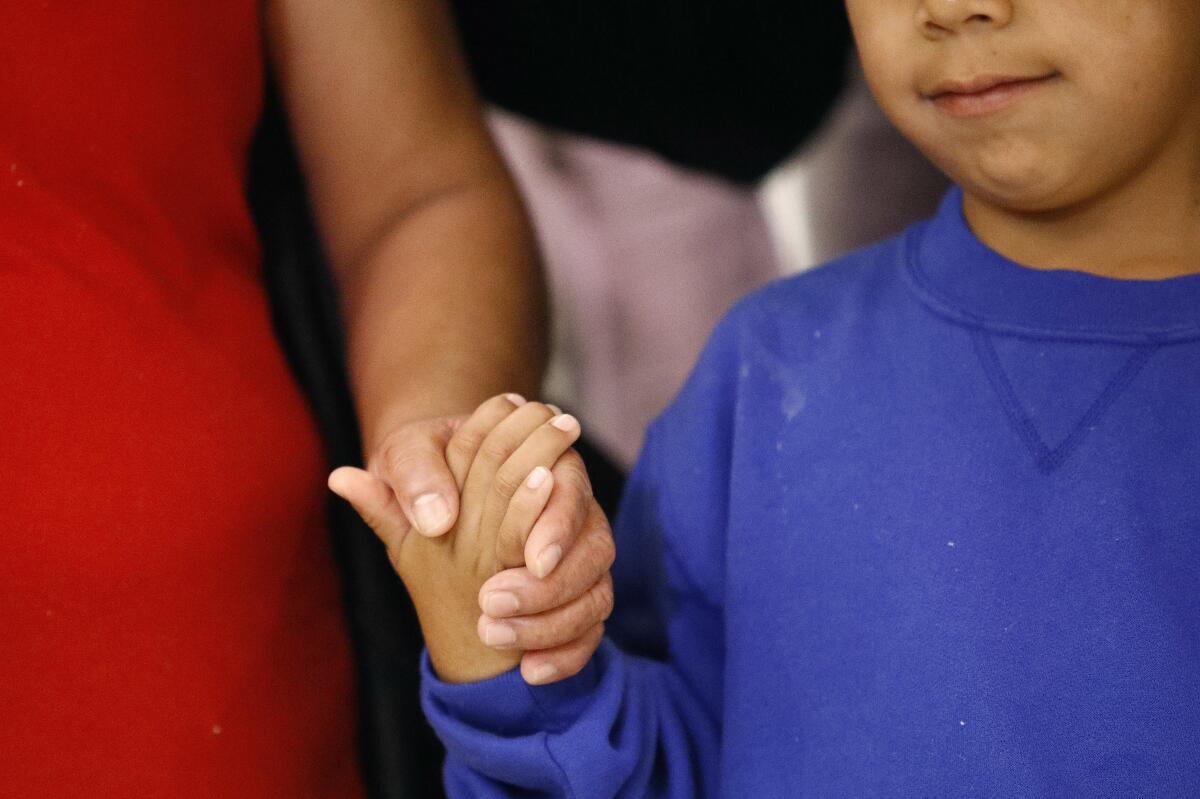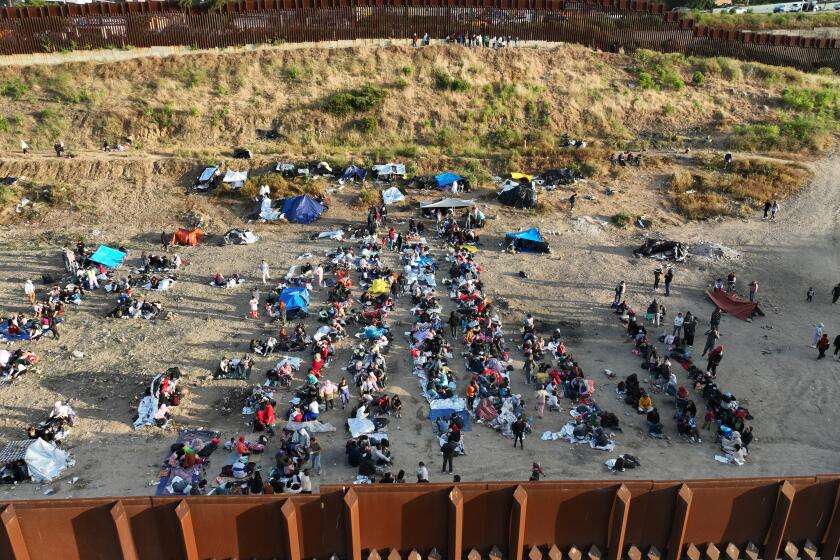How on Earth could Donald Trump consider separating families again?

- Share via
If Donald Trump had promised during his first presidential campaign to rip children away from their parents in order to deter Mexican and Latin American families from trying to cross into the United States, people would have probably laughed it off as hyperbole.
Take him seriously, said his fans, don’t take him literally.
We know how that turned out.
Still, it was shocking to hear Trump tell Kaitlan Collins during CNN’s abysmal town hall last week that if he were reelected he would consider reinstituting the practice.
“When you have that policy, people don’t come,” Trump said. “If a family hears that they’re going to be separated — they love their family — they don’t come. I know it sounds harsh. ... We have to save our country.”
Not just harsh. It is cruel, inhumane and, in my view, criminal.
There is no moral justification for terrorizing children and their parents, for inflicting lifelong emotional damage on people who are, for the most part, fleeing violence and poverty and trying to make better lives for themselves and their children.
What is the American dream if not that?
Donald Trump is an abnormal candidate who must not be normalized in some run-of-the-mill Q&A with voters. Can CNN avoid the media’s 2016 mistakes?
Trump’s careless willingness to emotionally torture families is just one of myriad reasons we cannot allow him anywhere near the White House again.
I didn’t really want to spend Mother’s Day thinking or writing about Trump.
I wanted to write about the extraordinary bonds between mothers and children. This is no knock on fathers, believe me. But there is a reason that fairy tales — stories that get at our most profound fears of loss and abandonment — so often involve the absence of a mother. That is a primal wound. And it’s not just fairy tales. All of the novels I’ve read lately explore the resonant theme of mother loss.
Two of them, “The School for Good Mothers,” by Jessamine Chan, and “Our Missing Hearts,” by Celeste Ng, take place in dystopian American societies where children are used as cudgels against their parents — in this case, mothers.
In Chan’s novel, an overwhelmed, sleep-deprived single mother whose husband has left her for his younger mistress is sent away to a kind of reeducation camp for having left her baby girl alone for a couple hours. She is held to impossible standards and forced to undergo bizarre parenting tests with a robot child, and her future as a state-approved mother does not look bright.
Celeste Ng’s new novel, ‘Our Missing Hearts,’ follows a boy named Bird in search of his mother after the U.S. has become a xenophobic police state.
In Ng’s novel, a politically rebellious Chinese American poet is forced to abandon her young son and leave him to be raised by her husband in order to thwart the xenophobic authorities who can legally remove children from parents not deemed patriotic enough. Her son sets out on a risky journey to find her.
The ache I felt reading both of them was, I think, not just tied to the injustice of forcing children and mothers to suffer painful separations for no good reason, but to the severe punishment of mothers for minor infractions.
Mothers are burdened by so many harsh expectations, perhaps most dangerously that a good one will sacrifice “everything” for her child.
I’m certain I bought into that trope as a young woman; otherwise I probably would not have been quite so aghast at the actions of the fictional Joanna Kramer, played by Meryl Streep in the hit 1979 movie “Kramer vs. Kramer.”
Rather than stay in a stultifying marriage with her workaholic husband, Ted, Joanna abandons him and their young son, Billy. She is so beaten down that she convinces herself it’s in Billy’s best interest for her to leave.
Hours after the end of Title 42 immigration restrictions, U.S. officials said they hadn’t seen an influx of crossings at the border or any significant increase in migration.
At the time, I found her decision horrifying. I guess, on some level, I still do.
A year and a half later, Joanna comes back and sues for custody. In that time, Ted, who at first didn’t even know what grade his kid was in, has mastered single parenthood. In a stark example of how the culture and courts so often undervalue fathers, Joanna is awarded custody of the boy. To her credit, she decides to share it with Ted. A happy ending, more or less, and perhaps one of the few times a mom is not punished for having left her child.
It’s one kind of sin when a parent abandons a child but quite another when the government purposefully separates a child from parents, with no apparent intention or process to reunite them, for patently cynical political reasons.
The other day, I sat down to reread Caitlin Dickerson’s Pulitzer Prize-winning 2022 Atlantic magazine investigation into the Trump administration’s family separation policy.
Families seeking asylum are finding themselves confronted with a seemingly impossible decision: Wait indefinitely for enough appointments to open up for the whole family through a new mobile app, or split up.
It is hard to believe we live in a country where federal officials would deliberately scheme to reduce immigration by wrenching children from their parents. Trump officials must have anticipated how the world would react because they tried to conceal the program’s real aim.
As Dickerson writes, the administration “declared that separating families was not the goal of the policy, but an unfortunate result of prosecuting parents who crossed the border illegally with their children. Yet a mountain of evidence shows that this is explicitly false: Separating children was not just a side effect, but the intent. Instead of working to reunify families after parents were prosecuted, officials worked to keep them apart for longer.”
The family separation policy was in effect from January 2017 to January 2021. As of February, the Department of Homeland Security had identified 3,924 separated children. Nearly 3,000 of them have been reunified with their families. Six years after the policy went into effect, almost 1,000 have not. That’s an eternity in a child’s life.
Can you imagine the trauma of living with a mother-sized hole in your heart and learning it is there because you were used as a pawn in a failed political game?
Trump was right about one thing the other night. We do have to save our country. Not from immigrants, though. From demagogues like him.
More to Read
A cure for the common opinion
Get thought-provoking perspectives with our weekly newsletter.
You may occasionally receive promotional content from the Los Angeles Times.















